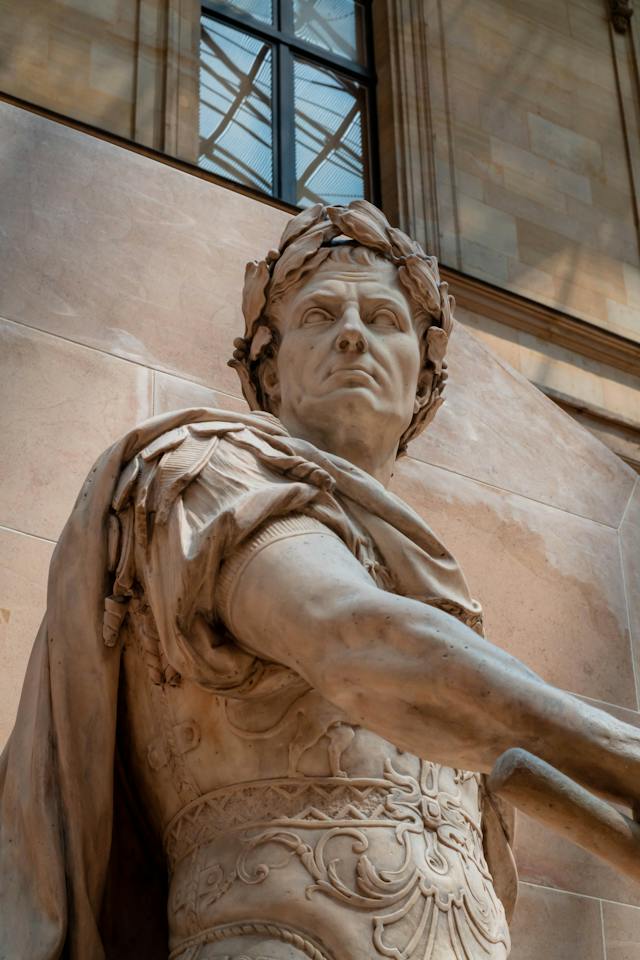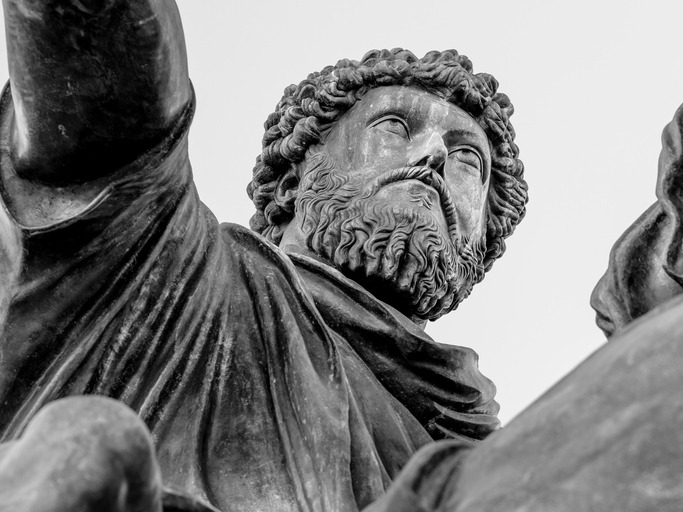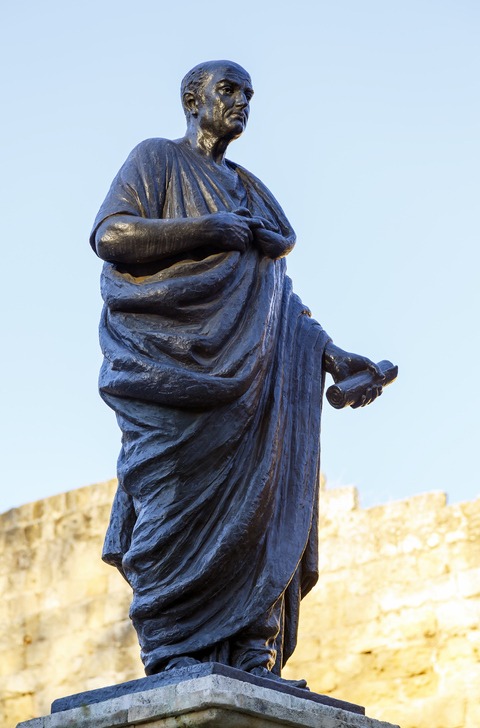But one thing is for sure – they are very quotable. Some quotes provide deep wisdom, some seem arrogant and some a bit ruthless… read on!
Here are some of the greatest quotes from Roman Emperors
1. I came, I saw, I conquered
In Latin, this quote goes, “Veni, vidi, vici.” It was a phrase used by Julius Caesar in a letter to the Roman Senate around 47 BC after achieving a quick victory in the short war against Pharnaces II of Pontus at the Battle of Zela. It was used to refer to a swift, conclusive victory. Julius Caesar was a Roman general and statesman. He was also a distinguished writer of Latin prose. He played a critical role in transforming the Roman Republic into the Roman Empire.
2. How pleasing to the wise and intelligent portion of mankind is the concord which exists among you
This quote is from Constantine the Great’s letter to the Antiochians. Constantine the Great was Roman Emperor from 306 to 307. He was also known as Constantine I or Saint Constantine. He was the first Roman Emperor to convert to Christianity. Along with co-Emperor Licinius, they issued the Edict of Milan in 313 that proclaimed tolerance of all religions throughout the empire.
3. I have often wondered how it is that every man loves himself more than all the rest of men, but yet sets less value on his own opinions of himself that on the opinions of others
This quotation was from Marcus Aurelius or Marcus Aurelius Antonius Augustus. He was the Roman Emperor from 161 to 180 AD, and considered as the last of the Five Good Emperors. He was also one of the foremost Stoic philosophers of his time which was evident from his work called “Meditations” while he was conducting his military campaign. It was written entirely in Greek.
4. Say not always what you know, but always know what you say
This quotation was from Claudius or Tiberius Claudius Caesar Augustus Germanicus, the Roman Emperor from 41 to 54 AD. He was Rome’s first ruler who was born outside of Italy. He was slightly deaf and had a limp but in spite of that, he proved himself to be an able administrator and patron of public building projects. During his reign, he also saw concerted attempts to conquer Britain. He was known to have fought an actual killer whale that was trapped in the Ostia harbor.
5. Young men, hear an old man to whom old men hearkened when he was young
This quote was from Augustus or Gaius Octavius. He was the founder of the Roman Empire and the first Emperor who ruled from 63 BC until his death in 14 AD. He was also Julius Caesar’s adopted heir. His reign started what is known as Pax Romana or the Roman Peace. It was an extensive period of almost two centuries when the Roman realm was not disturbed by any long-drawn major conflict even when the empire had regular territorial expansions into regions such as Germania, Egypt, Dalmatia, Pannonia, and complete annexation of Hispania.
6. The universe is transformation: life is opinion
This is another quote from Roman Emperor Marcus Aurelius. He was also known to have taken lessons in oratory from two Greek tutors and one Latin tutor. His choice of tutor made it evident how the Roman aristocracy of the time still valued Greek as a language.
7. Would that the Roman people had but one neck!
This quote was from Caligula. He was the third Roman Emperor and a member of the Julio-Claudian dynasty. He ruled from 37 to 41 AD. He was the son of Germanicus who is the nephew and adopted son of Emperor Tiberius, a very successful general and on of Rome’s most beloved public figures. Unfortunately, Caligula is considered as one of the most evil emperors in the history of Rome. For more information on Caligula and other evil or bad emperors, check out the 10 Worst and Craziest Roman Emperors of All Time.
8. Hidden talent counts for nothing
This quote was from Nero, the Roman Emperor from 54 to 68 AD. He was the last Emperor in the Julio-Claudian dynasty. He was adopted by his great-uncle Claudius to be his successor. Nero focused his attention on diplomacy, trade, and enhancing the cultural life of the Empire during his reign.
9. Can anyone be proved innocent, if it be enough to have accused him?
This quote was from Flavius Claudius Julianus or known as Julian. He was a Hellenistic philosopher, military leader, Roman Emperor, and satirist. He was also often referred to as Julian the Apostate because he rejected formal Christian doctrines and opposed to their spread. He was the last pagan Augustus of the Roman Empire.
10. To have command is to have all the power you will ever need. To have all the power you will ever need, is to have the world in the palm of your hand.
This quote was from Tiberius who was the Roman Emperor from 14 AD to 37 AD. He was a Claudian by birth and the son of Tiberius Claudius Nero and Livia Drusilla. In 39 BC, his mother divorced Nero and married Augustus, making him a step-son of Octavian.
Here are 10 more interesting quotes from these almost emperors who have become legends today:
- If you want a rainbow, you have to deal with the rain. – Augustus
- The object of life is not to be on the side of the majority, but to escape finding oneself in the ranks of the insane. – Marcus Aurelius
- Because of a few, disasters come upon a whole people, and because of the evil deeds of one, many have to taste their fruits. – Basil I
- What we wish, we readily believe, and what we ourselves think, we imagine others think also. – Julius Caesar
- How absurd to try to make two men think alike on matters of religion, when I cannot make two timepieces agree. – Charles V, Holy Roman Emperor
- Say not always what you know, but always know what you say. – Claudius
- Our great mistake is to try to exact from each person virtues which he does not possess, and to neglect the cultivation of those which he has. – Hadrian
- Hidden talent counts for nothing. – Nero
- It is the duty of a good shepherd to shear his sheep, not to skin them. – Tiberius
- Everything we hear is an opinion, not a fact. Everything we see is a perspective, not the truth. – Marcus Aurelius
- I found Rome a city of bricks and left it a city of marble. – Augustus
- I speak Spanish to God, Italian to women, French to men, and German to my horse. – Charles V, Holy Roman Emperor
- I am the Roman Emperor, and am above grammar. – Sigismund, Holy Roman Emperor
Did You Know These Interesting Facts About the Roman Emperors ?
- On July 13, 100 B.C., Gaius Julius Caesar was born but he wasn’t born by cesarean section, despite what is commonly believed. Although the procedure was available at the time, it was typically fatal to the mother and was only used to try to save a child when a pregnant woman was already dead or close to death. Aurelia, Caesar’s mother, actually lived for nearly 50 years after her son was born.
- Few people are aware that Julius Caesar’s given name was Gaius, and that he took it from both his father and grandfather. The majority of people are familiar with the name Julius Caesar.
- The transition of power in the Roman Empire was just one of the many things that Emperor Constantine was responsible for during his reign. His rule is remembered as an important turning point in history because he converted to Christianity and founded an eastern capital city that would later be known by his name. This city would also serve as a transitional point between the ancient and medieval periods.
- On the orders of Constantine the Great, the Church of the Holy Sepulcher, which is now considered to be one of the most well-known churches in the world was built. Both the crucifixion and burial of Jesus Christ took place at this site. The tomb of Jesus Christ is also said to have been located here. Today, you can find it in the Old City of Jerusalem, more specifically in the Christian Quarter.
- Marcus Aurelius was a Roman emperor who was famous for his bravery in battle against the Germans and the Parthians. He ruled the empire for a long time. In addition, he is revered for his fearless leadership and his brilliant philosophical mind.
- During the time of the Roman Empire, it was common practice for emperors to adopt a child as their heir. Marcus, who was only 17 years old at the time, was given a forever family by Emperor Antoninus Pius. Marcus Aurelius, which translates to “Marcus the Golden,” became his new name.
- Emperor Claudius suffered from a wide variety of physical ailments and illnesses, some of which included tremors in the head and hands, a limp, a runny nose, and foaming at the mouth. His family considered his condition a sign of weakness and a source of great public embarrassment; however, historians have since speculated that he may have suffered from cerebral palsy or Tourette’s syndrome.
- After Caligula’s murder, Emperor Claudius took his place atop the Roman Empire as ruler.
- Gaius Caesar Germanicus was the real name given to Emperor Caligula, and it came from his father, Germanicus, and his grandfather, Agrippa the Elder. When he was only three years old, he went with his father on various military operations. This made the other soldiers laugh, and they began to make fun of him by calling him Caligula, which means “little boot.”
- The first Roman emperor was Augustus. He was one of the most influential Roman emperors and ruled from 27 BC to 14 AD.



